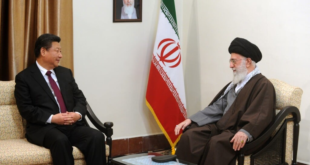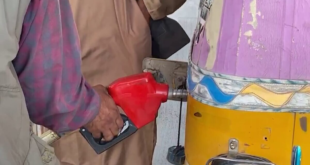Bangladesh and nations in Southeast Asia are welcoming the Group of Seven’s new answer to China’s One Belt, One Road initiative, saying it will be another source for financing their burgeoning infrastructure needs.
But because the U.S.-led Build Back Better World Partnership (B3W) initiative is scant in details, officials of some governments in the region and analysts say they also are waiting for more information to see how it can help their countries. China has an eight-year head start and has pumped huge amounts of money into its global infrastructure-building program (OBOR).
The new initiative, announced this month at the G7 summit in Cornwall, England, promises sustainable and value-driven infrastructure investment to the tune of “hundreds of billions of dollars” in low- and middle-income countries in the coming years.
The program will help narrow a U.S. $40 trillion need for infrastructure projects across the developing world, President Joe Biden said in announcing the new initiative.
B3W is “a good opportunity for us,” Bangladesh Planning Minister Abdul Mannan told BenarNews, an RFA-affiliated online news service, this week.
“We will try to exploit the opportunity for our development efforts. Other than the Chinese sources, B3W would allow us to explore funds for infrastructure development in Bangladesh,” he said.
Thailand, too, “welcomes” the G7 initiative and views it and Beijing’s OBOR initiative as “mutually reinforcing,” Thanee Sangrat, spokesman for the Ministry of Foreign Affairs, told BenarNews.
“Both aim to strengthen connectivity and create resilient supply chains in our region,” he said.
The Philippines welcomes B3W “but to see and to actually receive it is to believe [it],” presidential spokesman Harry Roque told BenarNews.
Indonesia, Southeast Asia’s largest and most populous country, is also waiting to see how B3W investments are made, according to Jodi Mahardi, spokesman for the investment ministry.
“We welcome the B3W development initiative proposed by the G-7, but we want to see the implementation. There have been many U.S.-led initiatives that are lacking in realization,” Jodi told BenarNews.
“The schemes must be flexible, based on the needs of partner countries, not on what Western countries see as good. I used the word ‘partner’ because we don’t want the relationship to be between donors and recipients, we want it to be [cooperation] between equals.”
BenarNews contacted Malaysia’s investment agency, the trade ministry, and the minister in charge of economics, but officials did not immediately return calls seeking comment.
Economists and political analysts in these countries said B3W investments would be good alternative sources of funding for infrastructure projects.
Ahsan H. Mansur, an economist and executive director of the Policy Research Institute in Dhaka, described the G7 initiative as “a big opportunity for us, the developing and low-income countries.”
“This is because now we have an alternative option to get funds from,” he told BenarNews.
B3W is not fully fleshed out yet but, in principle, is a good funding source for Indonesia, said Fithra Faisal Hastiadi, executive director of Next Policy, an Indonesian think-tank.
“I think B3W will be a good alternative for Indonesia as a non-aligned country. But I think the problem is the initiative is still half-baked,” Fithra told BenarNews.
Walden Bello, co-chair of the Board of Focus on the Global South, a Bangkok think-tank, was blunter. He dismissed the G7 initiative as “purely reactive.”
“[A]nd purely reactive programs tend to be put together in a hurry with little serious thought to follow-through,” he said.
For Oh Ei Sun, an international relations specialist based in Singapore, B3W will lead to countries in the region “playing both sides to see who will be able to offer more.”
“It’s all about the money, let’s not kid ourselves,” Oh told BenarNews.
Unveiled in 2013, OBOR is Chinese President Xi Jinping’s signature geopolitical program that aims to build a modern-day Silk Road through a network of ports, railways, roads, and trade routes to connect China to markets in Southeast Asia, South Asia, and beyond.
OBOR began eight years ago with a focus on investments around the world in energy, infrastructure, and transportation projects. Estimates about the size of OBOR investments vary widely – from $1 trillion to $8 trillion.
According to a London-based financial data firm Refinitiv, in January 2020 OBOR comprised close to 3,000 projects valued at $3.87 trillion.
Ongoing construction in Southeast Asia includes the $6 billion Bandung-Jakarta high-speed rail project in Indonesia and the $1.3 billion Kyaukphyu deep-water port in Myanmar, among others.
In Bangladesh, China has provided nearly $7 billion for nine development projects since October 2016, according to data from the Ministry of Finance.
‘More equitable way’
Some may see B3W and OBOR as complementary, but President Biden and the G7 see the two initiatives as fundamentally different.
“The point is that what’s happening is that China has this Belt and Road Initiative, and we think that there’s a much more equitable way to provide for the needs of countries around the world,” Biden told a press conference in Cornwall on June 13, according to a White House transcript.
“And we believe that will not only be good for the countries, but it’ll be good for the entire world and represent values that our democracies represent, and not autocratic lack of values.”
The democracies he referred to are the U.S. and fellow G7 members Canada, France, Germany, Italy, Japan, and the United Kingdom.
Biden was highlighting that China is not a democracy, and alluding to what critics have said is Beijing’s practice of predatory lending or debt-trap diplomacy in OBOR.
For instance, analysts point to Chinese loans to Sri Lanka, in particular, as a cautionary tale for nations planning to borrow from Beijing.
In 2017, a Chinese state-owned company took over a majority stake in Sri Lanka’s strategic Hambantota port after Colombo struggled to repay its loans from China.
B3W, on the other hand, emphasizes what it calls “enhanced multilateral finance,” the G7 said in a communiqué issued from Cornwall on June 13.
Multilateral development banks and other international financial Institutions “have evolved to embody the highest standards for project planning, implementation, social and environmental safeguards, and analytical capability,” the communiqué said.
“We emphasize the importance of transparent, open, economically efficient, fair and competitive standards for lending and procurement, also in line with debt sustainability, and the adherence of international rules and standards for major creditor countries,” the joint statement said.
B3W-related investments are to be guided by standards such as those promoted by the updated Blue Dot Network, G7’s communique added.
The Blue Dot Network, announced by the United States, Japan, and Australia in November 2019, assesses and certifies infrastructure projects for environmental sustainability, financial transparency, and economic impact.
‘Thailand shares G7’s endeavor’
Thailand, for one, especially welcomes the B3W’s focus on transparent and sustainable investments through clear and established international mechanisms, said Thanee, the foreign ministry spokesman.
“Thailand shares the G7’s endeavor in developing high-quality infrastructure with a fresh approach that advocates responsibility for the environment and for the people; fiscal sustainability; the participation of international investors and financial institutions; and compatibility with global standards by adopting international norms,” Thanee said.
“[T]he B3W initiative … supports our priorities.”
B3W’s priority investment areas will be climate, health and health security, digital technology, and gender equity and equality, according to a White House fact sheet about the initiative.
But transparency in investment, and funding in gender equity and health projects may be seen by some nations as “pet projects” that come “with strings attached,” said Oh, a senior fellow at the Singapore Institute of International Affairs.
“These are important only in the eyes of advanced liberal democracies” and not considered as vital in some other countries, Oh told BenarNews.
“The G7 is also harping on transparency which is in not the norm in most parts of the developing world,” Oh told BenarNews.
Oh, Indonesian economist Fithra, and other analysts cast doubt on whether the G7 countries, however advanced and industrialized, have the financial chops to compete with China’s massive OBOR investments.
Bello, the analyst based in Bangkok, noted that China’s initial commitment to OBOR was $1 trillion in 2013-2014, but had now ballooned to – by some estimates – around $4 trillion.
“Washington has already committed the bulk of what it plans to raise from taxes to the planned new U.S.-focused high-tech industrial policy program passed by the Senate over a week ago,” Bello told BenarNews, referring to the Innovation and Competition Act, which analysts say is intended to counter China.
“The biggest problem [for B3W] is the money, and with all these countries suffering fiscal crises, with the possible exception of Germany, where are they going to get the trillions of dollars to match China’s investment?”
European members of the G7, meanwhile, will have trouble convincing their citizens that infrastructure investments are needed around the world as they recover from the pandemic and the effects of Brexit, Fithra said.
“If they have to chip in for the initiative, where does the money come from? There will be opposition from their own people. So it’s like a paper tiger,” he said.
Chan Hoi Cheong, a senior political and security risk analyst at Safeture AB’s Malaysia branch, said B3W may have come too late in the geopolitical game.
“If B3W aims to capture the hearts and minds of Asian countries, it will have a lot of catching up to do,” Chan told BenarNews.
 Eurasia Press & News
Eurasia Press & News



